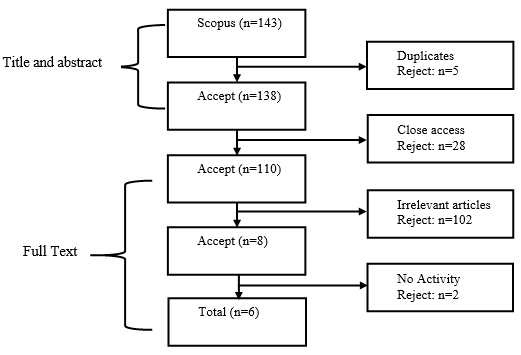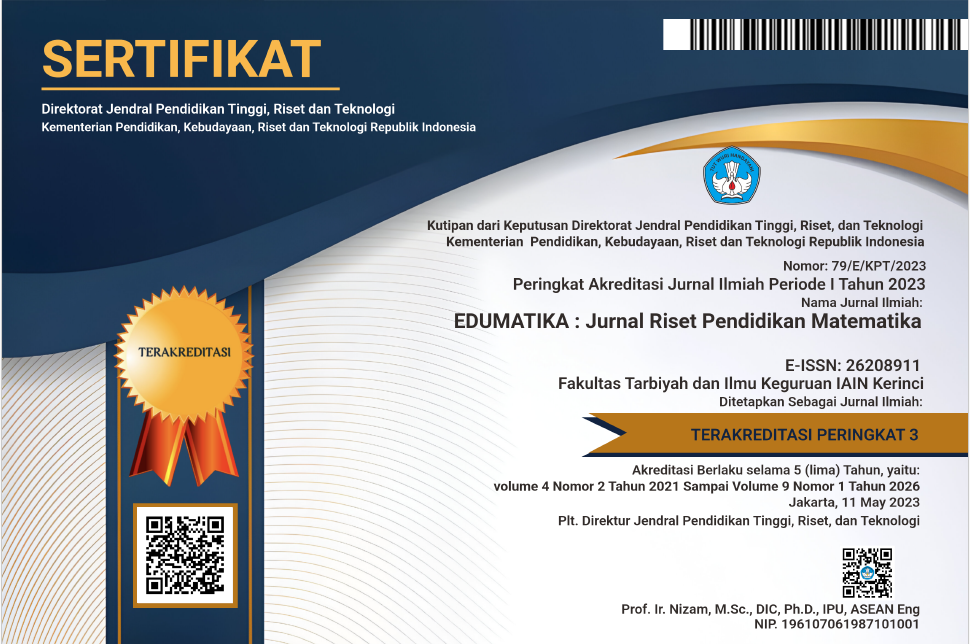Strategies, Successes, and Gaps in Algebra Teaching: A Scoping Review
Abstract
Algebra is a fundamental component of mathematics education that supports students’ success in higher-level mathematical learning. However, many students struggle to understand algebraic concepts due to their abstract nature and the limited use of effective instructional strategies. This scoping review aims to (1) identify how algebra teaching activities are represented in the literature, (2) explore the main instructional themes and approaches discussed, and (3) examine existing research gaps that require further study. A total of 143 studies published between 2015 and 2025 were retrieved from the Scopus database, and after a rigorous screening process, six studies met the inclusion criteria for full analysis. The review identified five dominant instructional themes: contextual problem-based learning, visual and concrete representations, technology-enhanced and game-based learning, collaborative discussions, and reflective reasoning. These approaches were found to enhance students’ engagement, conceptual understanding, and algebraic reasoning. Nevertheless, significant gaps remain in early algebra instruction, teacher professional development, and the integration of emerging technologies in classroom practice. The findings underscore the need for innovative, inclusive, and technology-integrated teaching strategies to strengthen students’ algebraic thinking and improve the quality of mathematics education.
Downloads
References
Arksey, H., & O’Malley, L. (2005). Scoping studies: Towards a methodological framework. International Journal of Social Research Methodology, 8(1), 19–32. https://doi.org/10.1080/1364557032000119616
Bertrand, M. G., Sezer, H. B., & Namukasa, I. K. (2024). Exploring AR and VR tools in mathematics education through culturally responsive pedagogies. Digital Experiences in Mathematics Education, 10(3), 462–486. https://doi.org/10.1007/s40751-024-00152-x
Blanton, M., Brizuela, B. M., Stephens, A., Knuth, E., Isler, I., Gardiner, A. M., Stroud, R., Fonger, N. L., & Stylianou, D. (2018). Implementing a framework for early algebra. In C. Kieran (Ed.), Teaching and learning algebraic thinking with 5- to 12-year-olds (pp. 27–49). Springer. https://doi.org/10.1007/978-3-319-68351-5_2
Booth, J. L., Newton, K. J., Tsang, J. M., & Barbieri, C. (2021). Algebraic thinking and misconceptions: A review. Educational Psychology Review, 33(2), 275–295. https://doi.org/10.1111/cdev.13568
Calor, S. M., Dekker, R., van Drie, J. P., Zijlstra, B. J. H., & Volman, M. L. L. (2020). Correction to: “Let us discuss math”; Effects of shift-problem lessons on mathematical discussions and level raising in early algebra. Mathematics Education Research Journal, 32(4), 765–767. https://doi.org/10.1007/s13394-019-00283-0
Carpenter, T. P., Levi, L., Franke, M. L., & Zeringue, J. K. (2005). Algebra in elementary school: Developing relational thinking. ZDM – International Journal on Mathematics Education, 37(1), 53–59. https://doi.org/10.1007/BF02655897
Elita, G. S., Habibi, M., Putra, A., & Ulandari, N. (2019). Pengaruh pembelajaran problem based learning dengan pendekatan metakognisi terhadap kemampuan pemecahan masalah matematis. Mosharafa: Jurnal Pendidikan Matematika, 8(3), 447–458. https://doi.org/10.31980/mosharafa.v8i3.517
Fairuzi, M. F., & Liesdiani, M. (2024). Analisis belajar siswa dalam menerapkan media KAJAR (Kartu Aljabar) untuk meningkatkan prestasi belajar siswa di SMPQ Al-Asrar. Jurnal Pendidikan Matematika, 8(2), 2108–2117. https://doi.org/10.31004/cendekia.v8i3.3297
Fitria, A., Subanji, Susiswo, & Susanto, H. (2023). Cognitive map: Diagnosing and exploring students’ misconceptions in algebra. Mathematics Teaching-Research Journal, 15(5), 49–75. EJ1412238.pdf
Fyfe, E. R., Rittle-Johnson, B., & DeCaro, M. S. (2012). The effects of feedback during exploratory mathematics problem solving: Prior knowledge matters. Journal of Educational Psychology, 104(4), 1094–1108. https://doi.org/10.1037/a0028389
Gravemeijer, K., & Doorman, M. (2022). Context problems in realistic mathematics education: A calculus course as an example. Educational Studies in Mathematics, 109(2), 223–242. ESM-artikel.pdf
Hamidah, I., Zulkardi, Z., Putri, R. I. I., Susanti, E., & Nusantara, D. S. (2024a). Hypothetical learning trajectory design in reflection learning using the context of the Cirebon Red Mosque. Jurnal Pendidikan Matematika (JUPITEK), 7(1), 1–10. https://doi.org/10.30598/jupitekvol7iss1pp1-10
Hamidah, I., Zulkardi, Ilma, R., Putri, I., & Pramuditya, S. A. (2024b). How is the implementation of realistic mathematics education on mathematical literacy skills? A systematic literature review. Jurnal Pendidikan Matematika, 13(3), 741–756. https://doi.org/10.31980/mosharafa.v13i3.2089
Hamidah, I., Zulkardi, Putri, R. I. I., & Pramuditya, S. A. (2025). Developing a mathematical literacy learning environment for students through educational game assistance. Mathematics Education Journal, 19(1), 141–162. https://doi.org/10.22342/jpm.v19i1.pp141-162
Hatisaru, V., Stacey, K., & Star, J. R. (2024). Mathematical connections in preservice secondary mathematics teachers’ solution strategies to algebra problems. Avances de Investigación en Educación Matemática, 25, 33–55. https://doi.org/10.35763/aiem25.6354
Hidayat, W., Rohaeti, E. E., Hamidah, I., & Putri, R. I. I. (2023). How can android-based trigonometry learning improve the math learning process? Frontiers in Education, 7, 1–13. https://doi.org/10.3389/feduc.2022.1101161
Hwang, G. H., Lee, C. Y., & Kuo, T. H. (2015). The development of a game-based formative assessment mathematical algebra tutorial app. In Proceedings of the 23rd International Conference on Computers in Education (pp. 729–738). https://icce2023.apsce.net
Kieran, C. (2018). The early learning of algebra: A structural perspective. In C. Kieran (Ed.), Research issues in the learning and teaching of algebra: The research agenda for mathematics education (Vol. 4, pp. 33–56). Routledge. https://doi.org/10.4324/9781315044378-4
Levac, D., Colquhoun, H., & O’Brien, K. K. (2010). Scoping studies: Advancing the methodology. Implementation Science, 5(1), 69. https://doi.org/10.1186/1748-5908-5-69
Masduki, M., Suwarsono, S., & Budiarto, M. T. (2019). Teacher’s strategies to promote student’s mathematical competencies in algebra: A case study. Journal of Physics: Conference Series, 1265(1), 012016. https://doi.org/10.1088/1742-6596/1265/1/012016
Mathaba, P. N., Bayaga, A., Tîrnovan, D., & Bossé, M. J. (2024). Error analysis in algebra learning: Exploring misconceptions and cognitive levels. Journal on Mathematics Education, 15(2), 575–592. https://doi.org/10.22342/jme.v15i2.pp575-592
Munn, Z., Peters, M. D. J., Stern, C., Tufanaru, C., McArthur, A., & Aromataris, E. (2018). Systematic review or scoping review? Guidance for authors when choosing between a systematic or scoping review approach. BMC Medical Research Methodology, 18(1), 143. https://doi.org/10.1186/s12874-018-0611-x
O’Neill, F., Dickson, G., Ströbel, T., & Thompson, A. J. (2023). Elite athlete activism, advocacy, and protest: A scoping review. European Sport Management Quarterly, 25(1), 145–173. https://doi.org/10.1080/16184742.2023.2287471
Pertiwi, N. P., Saputro, S., Yamtinah, S., & Kamari, A. (2024). Enhancing critical thinking skills through STEM problem-based contextual learning: An integrated e-module education website with virtual experiments. Journal of Baltic Science Education, 23(4), 739–766. https://doi.org/10.33225/jbse/24.23.739
Pincheira, N., & Alsina, Á. (2024a). Assessing knowledge to teach early algebra from the mathematical knowledge for teaching (MKT) perspective: A support tool for primary school teachers. Journal on Mathematics Education, 15(2), 639–660. http://doi.org/10.22342/jme.v15i2.pp639-660
Pincheira, N., & Alsina, Á. (2024b). Mathematical knowledge of early algebra exhibited by pre-service early childhood education teachers. International Journal of Science and Mathematics Education, 23(2), 461–487. https://doi.org/10.1007/s10763-024-10478-y
Putra, A., Zulkardi, Z., Putri, R. I. I., & Nusantara, D. S. (2023). Scoping literature review: What activities can help students discover permutations? Edumatika: Jurnal Riset Pendidikan Matematika, 6(2), 105–117. https://doi.org/10.32939/ejrpm.v6i2.3167
Rittle-Johnson, B., Fyfe, E. R., & Loehr, A. M. (2022). Conceptual and procedural knowledge: Their roles in learning algebra. Review of Educational Research, 92(1), 1–24. https://doi.org/10.1111/bjep.12124
Sibgatullin, I. R., Korzhuev, A. V., Khairullina, E. R., Sadykova, A. R., Baturina, R. V., & Chauzova, V. (2022). A systematic review on algebraic thinking in education. Eurasia Journal of Mathematics, Science and Technology Education, 18(1), em2061. https://doi.org/10.29333/ejmste/11486
Sun, S., Sun, D., & Xu, T. (2023). The developmental progression of early algebraic thinking of elementary school students. Journal of Intelligence, 11(12), 240. https://doi.org/10.3390/jintelligence11120222
Syarah, F., Harahap, Y. N., & Putri, J. H. (2023). Kesulitan siswa dalam mempelajari materi aljabar. Journal on Education, 5(4), 16067–16070. https://doi.org/10.31004/joe.v5i4.2656
Tricco, A. C., Lillie, E., Zarin, W., O’Brien, K. K., Colquhoun, H., Levac, D., … Straus, S. E. (2018). PRISMA extension for scoping reviews (PRISMA-ScR): Checklist and explanation. Annals of Internal Medicine. American College of Physicians. https://doi.org/10.7326/M18-0850
Wulandari, A. P., Salsabila, A. A., Cahyani, K., Nurazizah, T. S., & Ulfiah, Z. (2023). Pentingnya media pembelajaran dalam proses belajar mengajar. Journal on Education, 5(2), 3928–3936. https://doi.org/10.31004/joe.v5i2.1074
Zulkardi. (2002). Developing a learning environment on realistic mathematics education for Indonesian student teachers [Doctoral dissertation, University of Twente]. PrintPartners Ipskamp. https://repository.unsri.ac.id/6353/
Zulkardi, Z., & Kohar, A. W. (2018). Designing PISA-like mathematics tasks in Indonesia: Experiences and challenges. Journal of Physics: Conference Series, 947(1), 012015. https://doi.org/10.1088/1742-6596/947/1/012015

Copyright (c) 2025 Ida Hamidah, Zulkardi Zulkardi, Ratu Ilma Indra Putri, Surya Amami Pramuditya

This work is licensed under a Creative Commons Attribution 4.0 International License.














